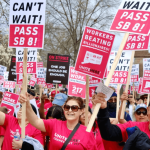
UK Companies Urge Government to Help Relax Immigration Rules
Last updated on September 13th, 2021 at 06:05 am
Companies urge Britain to relax its new immigration rules and ease labor shortages. Brexit and coronavirus pandemic has led to a significant labor shortage in companies, and seasonal farmworkers, a leading employers group, the Confederation of British Industry, stated.
Earlier this year, the economy got affected by the pandemic restrictions such as stay home and lockdown got eased. Companies started complaining about the scarcity of workers, particularly in food processing, hospitality, and logistics, impacting restaurant businesses and producing empty shelves in supermarkets.
CBI chief general Tony Danker stated that the government guaranteed an excellent immigration system that would zero in on the skills we need instead of unrestricted access to overseas laborers. However, here we require short term skilled workers, but the system is unable to respond.”
The UK government had likewise failed to follow the guidance on which occupations ought to meet all requirements for deficiency of job. CBI added that rules on what sorts of training equipped for support under an administration apprenticeship scheme were additionally excessively restraining.
Related Posts
The CBI added that butchers, drivers, welders, and bricklayers should be categorized as deficient occupations for immigration. This would permit more accessible access to visas and the businesses supporting them to pay wages beneath the threshold for migrant laborers under Britain’s new migration rules.
The public authority has approached employers to train more British citizens to fill their jobs; however, the CBI said it would require at least two years.
Britain’s administration has been hesitant to make changes to its migration rules. Last month, the business ministry dismissed a call from logistic and retailer firms for immunity for transporters and said the industry should improve their salary and conditions.
CBI didn’t expect to finish the administration’s furlough plan on Sept. 30, when a few hundred thousand private workers will probably become jobless, making it fundamentally more straightforward for organizations to discover more staff.














